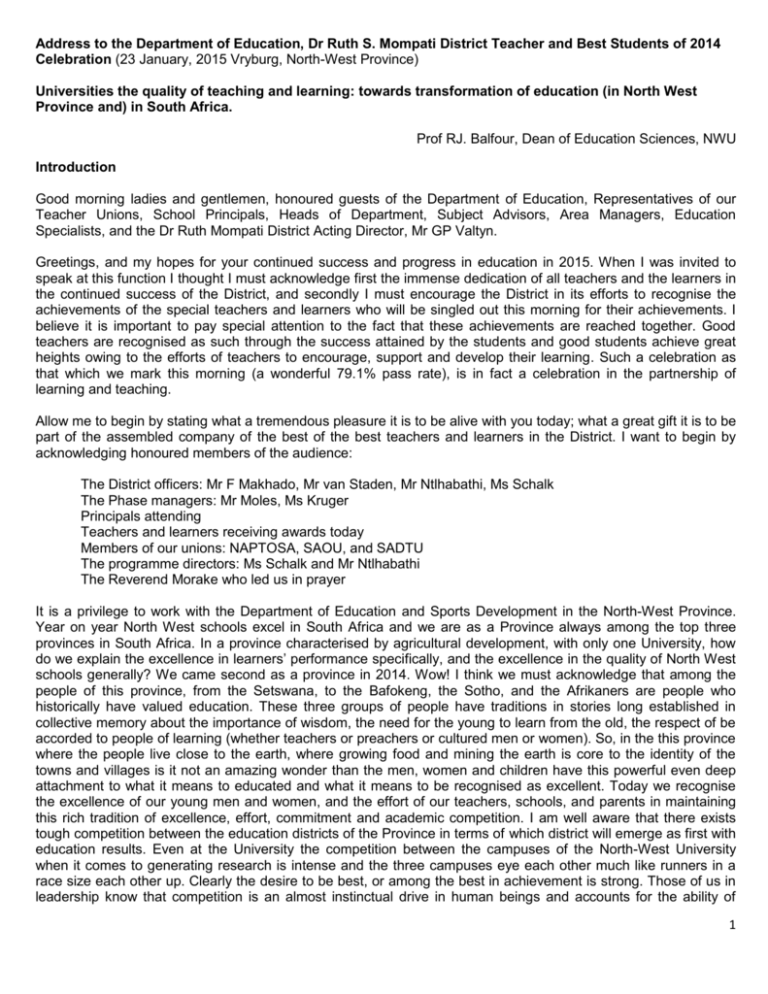Address to the Department of Education, Dr Ruth S. Mompati District
advertisement

Address to the Department of Education, Dr Ruth S. Mompati District Teacher and Best Students of 2014 Celebration (23 January, 2015 Vryburg, North-West Province) Universities the quality of teaching and learning: towards transformation of education (in North West Province and) in South Africa. Prof RJ. Balfour, Dean of Education Sciences, NWU Introduction Good morning ladies and gentlemen, honoured guests of the Department of Education, Representatives of our Teacher Unions, School Principals, Heads of Department, Subject Advisors, Area Managers, Education Specialists, and the Dr Ruth Mompati District Acting Director, Mr GP Valtyn. Greetings, and my hopes for your continued success and progress in education in 2015. When I was invited to speak at this function I thought I must acknowledge first the immense dedication of all teachers and the learners in the continued success of the District, and secondly I must encourage the District in its efforts to recognise the achievements of the special teachers and learners who will be singled out this morning for their achievements. I believe it is important to pay special attention to the fact that these achievements are reached together. Good teachers are recognised as such through the success attained by the students and good students achieve great heights owing to the efforts of teachers to encourage, support and develop their learning. Such a celebration as that which we mark this morning (a wonderful 79.1% pass rate), is in fact a celebration in the partnership of learning and teaching. Allow me to begin by stating what a tremendous pleasure it is to be alive with you today; what a great gift it is to be part of the assembled company of the best of the best teachers and learners in the District. I want to begin by acknowledging honoured members of the audience: The District officers: Mr F Makhado, Mr van Staden, Mr Ntlhabathi, Ms Schalk The Phase managers: Mr Moles, Ms Kruger Principals attending Teachers and learners receiving awards today Members of our unions: NAPTOSA, SAOU, and SADTU The programme directors: Ms Schalk and Mr Ntlhabathi The Reverend Morake who led us in prayer It is a privilege to work with the Department of Education and Sports Development in the North-West Province. Year on year North West schools excel in South Africa and we are as a Province always among the top three provinces in South Africa. In a province characterised by agricultural development, with only one University, how do we explain the excellence in learners’ performance specifically, and the excellence in the quality of North West schools generally? We came second as a province in 2014. Wow! I think we must acknowledge that among the people of this province, from the Setswana, to the Bafokeng, the Sotho, and the Afrikaners are people who historically have valued education. These three groups of people have traditions in stories long established in collective memory about the importance of wisdom, the need for the young to learn from the old, the respect of be accorded to people of learning (whether teachers or preachers or cultured men or women). So, in the this province where the people live close to the earth, where growing food and mining the earth is core to the identity of the towns and villages is it not an amazing wonder than the men, women and children have this powerful even deep attachment to what it means to educated and what it means to be recognised as excellent. Today we recognise the excellence of our young men and women, and the effort of our teachers, schools, and parents in maintaining this rich tradition of excellence, effort, commitment and academic competition. I am well aware that there exists tough competition between the education districts of the Province in terms of which district will emerge as first with education results. Even at the University the competition between the campuses of the North-West University when it comes to generating research is intense and the three campuses eye each other much like runners in a race size each other up. Clearly the desire to be best, or among the best in achievement is strong. Those of us in leadership know that competition is an almost instinctual drive in human beings and accounts for the ability of 1 people to reach great heights in Science and Culture as two characteristics of what it means to be a civilized human being. Achievement as only one measure of success Where does achievement begin? The parents of bright children mostly say that it is the child itself that shows a love for knowledge, and that grows in the sunshine of praise by teachers and parents. Children themselves when asked how they come to achieve, will often point to the inspiration of a teacher whose encouragement and attention enabled them to achieve academically. If you ask teachers how do they explain excellence in their children, they will say something along the lines of children having talent and working hard. What is clear from the several explanations is that the achievement is individual. Even if in the race of life, we are measured against each other, the truth is that without the athletes on either side of you, there is no race. It is one of the contradictions in life one comes to know yourself through the group around you. Somehow as human beings we need to affirmation of people around us, teachers, friends, family, people younger, older people. Simply put, the achievement we recognise today is the effort of a group that enables us to celebrate the individual. In my writing for the press in South Africa I am careful to point out that the diversity of voices in the media provides a full and largely unsympathetic view of education as a system. We read about the under-performance of learners in the Annual National Assessments, some critics remain doubt as to the credibility of the National Senior Certificate results, others from universities and even the Development Bank express their doubt about the rigor of curriculum, but very few people comment on the teachers themselves, and not only in terms of professional competence or depth of subject-knowledge, but as examples for exemplary adult life to the new generations of young people sitting before them in the various grades of education. The achievement of our teachers here today is similarly then, a record of the schools and teams (colleagues, managers, friends) who support them. Teachers’ excellence, learners’ excellence, schools excellence Given that even the best schools in South Africa do not measure up particularly well in the international TIMSS and PIRLS measures, the perceptions as regards learner performance need to be contextualised in relation to our understanding of the quality of teaching. International test results conclude the performance is mathematics is underscored by high performance levels in literacy and that both require effective schools stating that “an effective school was safe and orderly, supported academic success, had adequate facilities and equipment, was staffed with well-prepared teachers, had well-resourced classrooms, and provided effective instruction” (TIMSS Report, 2011). Of these ingredients, the well-prepared teacher was most important. The State is aware that it will take decades to repair the damage of decades of Apartheid misrule. The massive reorganisation of higher education in 2004 was premised on the idea that teacher education needed to be taken from the former colleges of education, not because the quality of education received there was low, but because it was patchy and inconsistent. So too was the quality of education received by South African learners patchy and inconsistent. Making teacher training the responsibility of universities was the right decision: future teachers need to develop better subject content knowledge to a much deeper level. Does this mean that university educations as provided through our general degrees like the Bachelors of Commerce, or the Bachelor of Arts, Sciences, are suitable for teaching? At universities the debates in the last two years have concerned the extent to which teacher education provides for a better quality of teacher characterised not by expert knowledge of the curriculum (changeable an unbelievable every five years of so in SA), but rather by a teacher’s ability to lead in knowledge communication, and knowledge discovery beyond the prescriptions of the curriculum. We are reminded frequently by curriculum specialists that teacher effectiveness lies thus not only in mastery of knowledge communication, but also in possession of more knowledge than provided for as minimum in curriculum documents. Two issues come to mind in relation to this notion of the ‘competent’ teacher. The first concerns debate in universities about suitable models for teacher education: typically the Bachelors and Higher Diploma type model is contrasted to the four year Bachelor of Education (BEd) professional degree. In 2014 a special national 2 symposium was convened by NWU, UJ, UP and Wits in South Africa to explore issues concerning depth and rigour in teacher education qualifications. Some of the issues discussed are mentioned below. Some experts argue that content knowledge is better absorbed within the dedicated Bachelor’s degree (BA, BMus, BSc etc). Others suggest that content knowledge has to be taught in relation to teaching methodology suited to the age and phase the child is in. Many teachers and academics are skeptical that the old model for training secondary teachers was better. Is a one year postgraduate Diploma sufficient for anything except a superficial understanding of learning? I know some academics in teacher education who say that sometimes they have to supplement the content knowledge in English or Science because it was not covered by students in their Bachelors’ degrees. The “jury is still out” as regards the question concerning which model works best. What prevents neat arguments along these lines is simply the degree of diversity in the higher education sector itself where universities’ undergraduate curricula are determined by the areas of specialization offered by academics, or by virtue of specialisation of the relevant Department - it is well known that English Studies at Rhodes has a more Anglo-American focus than, for example, English Studies at UKZN which has a more (South) African focus. Or, for example, not all geography departments in faculties of science teach Human Geography (a part of the school curriculum), and not all language departments cover the range of genres stipulated in the NCS either. In view of the diversity within the higher education sector, it is hard to argue with certainty that the old ways of teaching education (a three year degree, capped by a diploma) were adequate from a content-knowledge perspective. In fact, with the many evident gaps in teacher’s current knowledge, the ‘old’ model has much to answer for, both in teacher education faculties and in terms of the knowledge covered in faculties within Bachelor’s degrees. Equal access to good quality education in schools: are South African schools basically equal? It is often that case at awards functions that one notices that several top achievers come from the same schools. In Potchefstroom Gimmies is in the limelight in some years because many of the achieving students seem to graduate from such schools. Today we celebrate the achievement of Vryburg High in similar terms. In truth, parents who want the best for their children, and who can afford the fees, gravitate to these schools. The reputation of a school is thus built on the quality of teaching which is seen to have a link to the quality of learning. In recent years former township areas in South African cities have witnessed a migration of middle class families into the suburbs. Why does this happen? There is a perception, right or wrongly, that better education might be available at private or wealthier state funded schools. What is emerging in South Africa as the evil of racism dies a long death, is the new Apartheid of class. Working class families cannot afford the better education accessed by middle class South Africans in better schools. No child is born without abilities. Ability may not be determined by class background in a child, but opportunity to develop ability in order to excel seems to be something that can “be bought” in South Africa. And, this is wrong. Every child should have access to a good quality education, small class sizes and competent professional teachers. Poorer schools in working class communities are worst affected for two reasons. The first is that the township schools are already staffed by teachers not as well qualified as counterparts in ‘suburban’ middle class schools, and the second reason is that the lower economic catchments areas (typically township but also rural poor areas) have fewer resources to draw upon in terms of school fees or other forms of income to be derived from the local the communities. The ironies are plentiful. All over South Africa in the 50s and 60s former township areas become centres of social and cultural activity in which the solidarity of people oppressed by the regime, found expression in writing, art, music and religious life. As these areas have become impoverished arising from the gradual shift of the middle classes, the quality of community life, of which schools are a fundamental part, is changing. As these changes occur government needs to be more vigilant to ensure that our poorest communities received better and better education provision. Teachers need knowledge: not simply more content, but more knowledge about learning styles relevant to content Perceptions of low quality of teacher competence are affirmed by research, for example, suggesting that teacher absenteeism is related to inadequate subject content knowledge (Carnoy, Chisholm, and Chilisa, 2012). Consider also that research in the USA (2003) showed that the teachers most likely to exit the profession were those who performed highest on standardised aptitude tests (Billingsley, 2003). In South Africa, the HSRC (ELRC, 2005) 3 study found that 55% of teachers would want to leave the profession if they could, and that younger and newer teachers are more likely to leave the system earlier. Low status and low quality (of content knowledge especially) are thus challenges internal and external to the profession. What makes a teacher competent is confidence in his her subject area, and confidence is built both on skills and knowledge. How have teachers reacted to the pressures of underperformance? Some research suggests that teacher absenteeism is related to inadequate subject knowledge. Unable to meet the requirements of new curricula, teachers stay away (absenteeism). Frequent changes to the curriculum have been noted as contributing to teacher fatigue, and a further loss of confidence as the curriculum has changed so too have expectations as regards teachers’ knowledge of subject-content altered. In short teachers need to commit themselves to learning more, and the State needs to support this through SACE. We need to understand that teacher absenteeism, or poor school management are the consequences of a system that has been neglected for too long, and which is still taking time to come right. At the same time professional teachers, whether in Ikageng or Waterkloof, have a responsibility to improve their qualifications for themselves as well as the profession. Concluding remarks The North-West provincial leadership in education, together with me and the District wish all our teachers and learners who are received awards today, our heartfelt congratulations. We salute the work you are doing: we want you to know that the impact of your dedication is both recognised and valued in the education system, and we wish you a productive and excellent 2015 as teachers, leaders and young students. We ask that at times when the pressures of work and seemingly endless demands to deliver reports of one kind or another seem immense, that the teachers here today will recall with me the fact that your contribution to education is valuable, that you as people and colleagues are cherished, as we remain steadfast in our commitment to turn South Africa around by committing in ourselves to better quality education wherever we are. Thank you. 4







